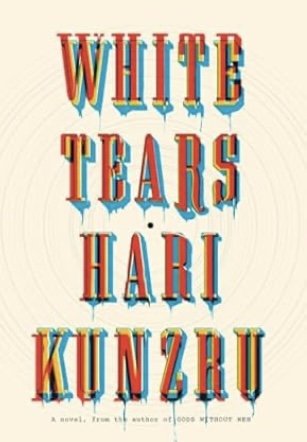White Tears by Hari Kunzru (Vintage Contemporaries, Random House) ~Janet Brown
Seth is obsessed with finding “hidden sounds below the every day” and wanders New York’s streets capturing everything he hears on a portable recorder. His ambition is to “store the world and play it, without change or addition.” His college friend, Carter, is obsessed with collecting vinyl recorded by obscure Black blues musicians from the past. A man with a healthy trust fund, he recognizes that Seth’s daily discoveries can be incorporated into music and sets up a sophisticated recording studio that makes this happen. Seth, believing “the old world was dissolving in digital rain” and “the future is reflective, metallic,” wants to turn sounds into art while Carter wants to turn them into wealth.
While walking through Washington Square, Seth watches two old chess players. When the game is over, the victor walks away, singing a scrap of the blues. Later when Seth replays his discoveries of that day, he finds what he has recorded is an entire song, one that captures him, and Carter too.
Carter, as a collector and connoisseur, can’t resist playing with this song in the studio. He finds some ragged, weird guitar playing that Seth picked up on the street, incorporates it into the chess player’s blues, scans “an authentic-looking label,” and gives the singer a made-up name. Then he puts the audio file sung by “Charlie Shaw” on an Internet site frequented by collectors.
It’s an experiment, a joke, one that might possibly get enough hits to become profitable. Instead the posted song attracts a viewer who demands to hear the record’s flip side. “I haven’t heard Charlie Shaw since 1959.”
Out of curiosity, Seth agrees to meet the man who calls himself Jumpjim and through this encounter is drawn into a miasma of death, dark-ops, and prison work camps, where time and racial identity shift without warning. Generational wealth, Carter’s family money, is based upon slavery that has morphed into international “Correctional Services.” Seth, who wanted most of all to avoid slippage, is pulled into a reality so slippery that it has no definition and no borders.
“It’s a post-racial America. All you got to do is get them into the system…Speeding tickets. Public nuisance. Once they’re in, your boot is on their neck.”
White Tears begins as a mystery. It quickly becomes as unsettling and revelatory as Ralph Ellison’s Invisible Man. Rocketing through New York, Mississippi, rural shacks where the blues were born, the madness of collectors, and the cruelty of unchecked greed, this is a novel that is bizarre, scathing, and a clear mirror of our times.
Born in England with a father from Kashmir and a British mother, parents who endowed him with a classical education, journalist and novelist Hari Kunzru came to Brooklyn well equipped to observe the effects of 9/11 on New York and on the world. “Toilet blocks in Afghanistan.” “The Occupy crowd.” “A behemoth of tentacles” that turn pain into money.
Back in the 20th Century, people talked about The Great American Novel--was it written by Twain, Fitzgerald, Hemingway, Steinbeck? The contenders were all male and all white. Almost 100 years later, this may well have been written by a man who is neither American or white, one with the distance that’s needed to see America without blinders.
